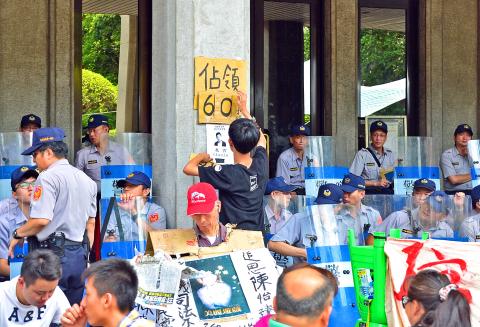With a student protest occupying the Ministry of Education’s forecourt entering its 60th hour as of noon yesterday, the discipline and persistence demonstrated by protestors at the site so far have led to members of the public describing it as a “reprise” of the Sunflower movement in March and April last year.
One memorable aspect of last year’s Sunflower movement, in which student protesters’ occupied the Legislative Yuan’s main chamber for almost 23 days in protest against the government’s handling of a cross-strait service trade agreement, was the way in which protesters organized groups to clean up trash and maintained order.
Hundreds of student protesters broke through a police barricade in front of the ministry’s compound in the early hours of Friday morning, demanding that the ministry withdraw changes to high-school curriculum guidelines.

Photo: Wang Yi-sung, Taipei Times
After entering the ministry compound, the students sat at the forecourt of the ministry building, exchanging ideas about the guideline alterations throughout the day and sleeping on the ground at night, protected by those who volunteered to take shifts standing guard.
Clumps of white roses from those who mourned student activist Dai Lin (林冠華) — who allegedly took his own life on Thursday to raise public awareness about the government’s indifference toward students’ appeals — covered barricades nearby.
A main stage for speeches has been set up, along with booths offering medical treatment, media liaisons and general services.
Protesters distributed food and bottled water they had prepared for their fellow demonstrators, while volunteers at a medical station on Zhongshan S Road, in front of the ministry, took care of those suffering from heatstroke.
Some demonstrators gave out flyers to passers-by, hoping to increase public awareness of their cause.
A female student at Hsinchu County’s Hulin Junior High School, surnamed Wan (萬), said she had slept outside the ministry building to express solidarity with other student protesters.
“I would like to express my gratitude to the high-school students for everything they have done,” she said.
Over the past two days, the protesters awoke at 7am for a group newspaper reading and discussion session, after which they vowed never to leave the compound unless the ministry withdraws the controversial curriculum guidelines.
Police on Saturday morning removed barbed wire and barricades. Later, some student protesters also performed a Hoklo (also known as Taiwanese) version of Do You Hear the People Sing? from Les Miserables and a song by Hong Kong rock group Beyond, which was used as the theme of the Occupy Central movement in Hong Kong last year.
Perimeters were once again set up by nightfall, but the demonstrators’ resolve that the ministry relinquish the altered guidelines seemed to grow stronger as the sit-in progressed, as students took turns delivering speeches onstage and put the white roses back on the barricades.
A woman surnamed Chu (朱) said that before the students’ protest over the curriculum issue, her mother and grandfather had been Chinese Nationalist Party (KMT) stalwarts, adding that it was not until they learned about the government’s alleged tampering with Taiwanese history that they found out how little they actually knew about Taiwan.
“I hope younger generations never have to study textbooks indoctrinating outdated ideas,” she said.
Additional reporting by Chen En-hui and Chien Li-chung

Taipei has once again made it to the top 100 in Oxford Economics’ Global Cities Index 2025 report, moving up five places from last year to 60. The annual index, which was published last month, evaluated 1,000 of the most populated metropolises based on five indices — economics, human capital, quality of life, environment and governance. New York maintained its top spot this year, placing first in the economics index thanks to the strength of its vibrant financial industry and economic stability. Taipei ranked 263rd in economics, 44th in human capital, 15th in quality of life, 284th for environment and 75th in governance,

Greenpeace yesterday said that it is to appeal a decision last month by the Taipei High Administrative Court to dismiss its 2021 lawsuit against the Ministry of Economic Affairs over “loose” regulations governing major corporate electricity consumers. The climate-related lawsuit — the first of its kind in Taiwan — sought to require the government to enforce higher green energy thresholds on major corporations to reduce emissions in light of climate change and an uptick in extreme weather. The suit, filed by Greenpeace East Asia, the Environmental Jurists Association and four individual plaintiffs, was dismissed on May 8 following four years of litigation. The

A former officer in China’s People’s Liberation Army (PLA) who witnessed the aftermath of the 1989 Tiananmen Square massacre has warned that Taiwan could face a similar fate if China attempts to unify the country by force. Li Xiaoming (李曉明), who was deployed to Beijing as a junior officer during the crackdown, said Taiwanese people should study the massacre carefully, because it offers a glimpse of what Beijing is willing to do to suppress dissent. “What happened in Tiananmen Square could happen in Taiwan too,” Li told CNA in a May 22 interview, ahead of the massacre’s 36th anniversary. “If Taiwanese students or

The New Taipei City Government would assist relatives of those killed or injured in last month’s car-ramming incident in Sansia District (三峽) to secure compensation, Mayor Hou You-yi (侯友宜) said yesterday, two days after the driver died in a hospital. “The city government will do its best to help the relatives of the car crash incident seek compensation,” Hou said. The mayor also said that the city’s Legal Affairs, Education and Social Welfare departments have established a joint mechanism to “provide coordinated assistance” to victims and their families. Three people were killed and 12 injured when a car plowed into schoolchildren and their